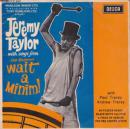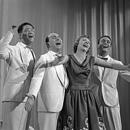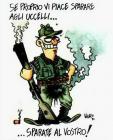Huberta (a True Story. Details Culled From the Library of the Johannesburg Sunday Times)
Jeremy TaylorLangue: anglais

I'll tell you the story of Huberta the Hippopotamus,
Who one day
Left her home in the Umbolosi
And wandered, far away.
Now she wandered for many a mile,
On a long and lonely exile,
Far away from the sugar plantation,
She knew when she was a child.
Well no one can tell you why she went to Durban,
For she gave no explanation,
But around midnight, she gave the city a fright,
By her appearance at the police station.
Furthermore we shall never know,
Why through the country club she didn't go,
And was finally seen, like a beauty queen,
Gazing in the chemist's window.
And then she visited Port St Johns,
Where she made a cursory call,
And the people there just stood and stared,
As she walked in through the town hall.
They said, "Johnny don't go too near.
Huberta, you can't stay here.
You're far to ugly for us to love,
Too clumsy for us to fear."
Huberta, why did you leave home?
What made you want to walk alone?
Who knows what lies in store for you,
And who can tell what men will do?
At last Huberta found a pool,
On a farm near King Williams town,
And finally, it seemed that she
Had decided to settle down.
But the public for interviews sought her,
And especially the reporters.
But Huberta was shy, and refused to comply,
Plunging back into the dark waters.
One day some Zulus passing by
Began to pelt Huberta with stones.
But hearing their cry, a witch doctor nearby,
At once consulted his sacred bones,
And forthwith proclaimed that Huberta
Was the risen spirit of Chaka.
And later, it's said, three men lay dead,
All punished for their misdemeanour.
Whenever horses or cows came by,
She invited them to stay.
She wagged her tail and advanced politely,
But always they ran away.
And then the sorrowful sight,
Huberta would sadly capsize.
Back into the pool where the muddy water,
Would hide the tears in her eyes.
Huberta, why don't you go home,
You know, you know, your turn will come.
For in this world of men and guns,
They'll spill your blood where the river runs.
Early in the morning four farmers came,
Their hands all sweaty, and their eyes aflame,
They said, "You've got no right to be on our land.
We'll teach you a lesson that you'll understand."
But Huberta made no effort to run,
So they dried their hands, and they levelled their guns,
They fired in her nose, in her eyes, in her head,
They fired in her belly till the river ran red,
Red blood, blood red. River, don't cry.
You know Huberta was born to die.
Huberta, why did you leave home?
What made you want to walk alone?
A fish can live where a dog will die.
A man can't go where the swallows fly.
Who one day
Left her home in the Umbolosi
And wandered, far away.
Now she wandered for many a mile,
On a long and lonely exile,
Far away from the sugar plantation,
She knew when she was a child.
Well no one can tell you why she went to Durban,
For she gave no explanation,
But around midnight, she gave the city a fright,
By her appearance at the police station.
Furthermore we shall never know,
Why through the country club she didn't go,
And was finally seen, like a beauty queen,
Gazing in the chemist's window.
And then she visited Port St Johns,
Where she made a cursory call,
And the people there just stood and stared,
As she walked in through the town hall.
They said, "Johnny don't go too near.
Huberta, you can't stay here.
You're far to ugly for us to love,
Too clumsy for us to fear."
Huberta, why did you leave home?
What made you want to walk alone?
Who knows what lies in store for you,
And who can tell what men will do?
At last Huberta found a pool,
On a farm near King Williams town,
And finally, it seemed that she
Had decided to settle down.
But the public for interviews sought her,
And especially the reporters.
But Huberta was shy, and refused to comply,
Plunging back into the dark waters.
One day some Zulus passing by
Began to pelt Huberta with stones.
But hearing their cry, a witch doctor nearby,
At once consulted his sacred bones,
And forthwith proclaimed that Huberta
Was the risen spirit of Chaka.
And later, it's said, three men lay dead,
All punished for their misdemeanour.
Whenever horses or cows came by,
She invited them to stay.
She wagged her tail and advanced politely,
But always they ran away.
And then the sorrowful sight,
Huberta would sadly capsize.
Back into the pool where the muddy water,
Would hide the tears in her eyes.
Huberta, why don't you go home,
You know, you know, your turn will come.
For in this world of men and guns,
They'll spill your blood where the river runs.
Early in the morning four farmers came,
Their hands all sweaty, and their eyes aflame,
They said, "You've got no right to be on our land.
We'll teach you a lesson that you'll understand."
But Huberta made no effort to run,
So they dried their hands, and they levelled their guns,
They fired in her nose, in her eyes, in her head,
They fired in her belly till the river ran red,
Red blood, blood red. River, don't cry.
You know Huberta was born to die.
Huberta, why did you leave home?
What made you want to walk alone?
A fish can live where a dog will die.
A man can't go where the swallows fly.
envoyé par Bernart Bartleby - 17/5/2014 - 21:24
Si potrebbe inserire nel percorso "Guerra agli animali"... ci ho pensato adesso...
Bernart Bartleby - 18/5/2014 - 21:59
×
![]()







Nel disco live alla Eton Art School, “Sydney Carter & Jeremy Taylor at Eton”, 1967.
Con Sydney Carter.
Testo trovato sul solito magico Mudcat Café
Jeremy Taylor è inglese ma ha vissuto per decenni in Sudafrica. Là si è inventato uno stile del tutto personale fondato su di una solida preparazione musicale folklorica tipicamente britannica ma caratterizzato da performance di sapore cabarettistico, con canzoni piene di umorismo il cui sottotesto è quasi sempre la denuncia politica e sociale, delle contraddizioni e delle idiosincrasie della società moderna. Così, nonostante la sua delicatezza e simpatia, ed il grande apprezzamento del pubblico, le storie solo apparentemente buffe ed innocenti proposte da Jeremy Taylor non furono gradite dalle autorità sudafricane nell’era dell’Apartheid, e l’intera sua produzione fu bandita.
Questa che propongo è una tipica canzone di Jeremy Taylor. Ci racconta di quanto sia difficile per l’essere umano accettare la diversità e di come i cosiddetti diversi siano spesso oggetto, nella migliore delle ipotesi, di fastidio o di curiosità, quando non vittime sacrificali della barbarie e del pregiudizio.
E’ la storia veramente vera di un’ippopotama sudafricana, chiamata Huberta, che non era come tutti gli altri della sua specie: curiosa, vivace, intraprendente, chissà perchè e chissà per come un bel giorno del 1928 Huberta lasciò il suo branco nel St Lucia Estuary, Zululand, e si mise in marcia, percorrendo in tre anni un viaggio solitario che la portò a Eastern Cape, a 1.600 km di distanza. Huberta, diventata nel frattempo una celebrità ed una beniamina di famiglie e bambini, decise ad un certo punto di fermarsi sul Mhlanga River, nel Natal, e lì pensarono di prenderla per rinchiuderla nello zoo di Johannesburg, visto che il suo peregrinare aveva dato già ben più di un problema alla viabilità e all’ordine pubblico, ma ogni tentativo di catturare l’intelligente e insolito animale risultò vano. Disturbata, Huberta riprese il cammino e arrivò fino a Durban, sistemandosi prima su una spiaggia e poi in un country club (con piscina, immagino). Arrivata poi all’Umgeni River, fu adottata come animale sacro dalla locale popolazione di etnia Zulu e Xhosa.
Nella primavera del 1931, spintasi fino a East London sulla costa a sud-est, Huberta fu uccisa da dei bracconieri, sebbene fosse stata appena dichiarata “Royal Game”, esemplare protetto. I suoi assassini furono catturati e multati di 25 rand.
Impagliata a Londra, Huberta ora (non) riposa all’Amathole Museum di King William's Town. (fonte: en.wikipedia)